Theatre? Yoga? Music gig? You'll find it in a Welsh church
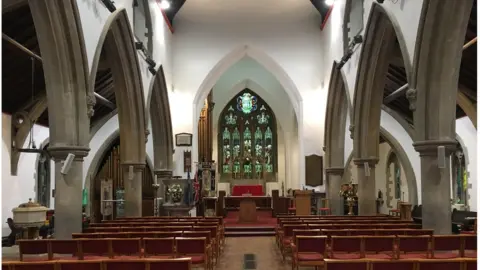 BBC
BBCLooking for something local to do? Why not pop along to a yoga class in the morning then go out to an indie music concert in the evening?
Nothing unusual in that, you might think, until you look at the venue.
It's a church - not a church hall - complete with altar, crosses, stained glass, font, the works. But the fact that the building is sanctified and used for worship has not stopped its priest and committee opening it up to members of the community who may otherwise never set foot inside a church.
The changes at St John's in Canton, Cardiff, reflect a wider move to break down the traditional role of church buildings in the community, as endorsed by the incoming Archbishop of Wales on his appointment in September.
Part of this is driven, of course, by a need for churches to diversify in order to counteract the effect of falling congregations and a decline in religious belief, which has an impact on the church's revenues.
In September, BBC Wales reported the Church in Wales had sold more than 100 churches over the past decade, with that rate likely to continue.
When Father Mark Preece took over at St John's 15 years ago, he inherited a traditional pew-lined Victorian church which came with a run-down but well-used post-war church hall just round the corner on the main road.
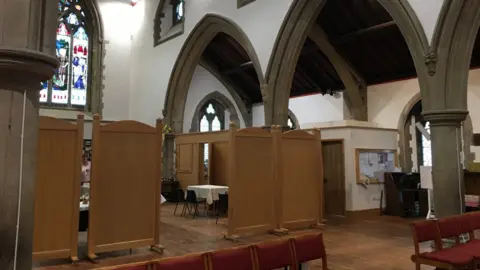
It was a crisis with the hall that set the church down its current path.
Mr Preece said: "The heating system broke and there were not reserves to replace it.
"We were conscious of the excess space we had in the church building and we began to think how best to use what we had. We took the decision to sell the hall and use the proceeds to create a multi-purpose space in the church building."
The £450,000 from the sale of the hall in 2005, was invested for St John's by the Church in Wales while they took time to carefully consider the conversion.
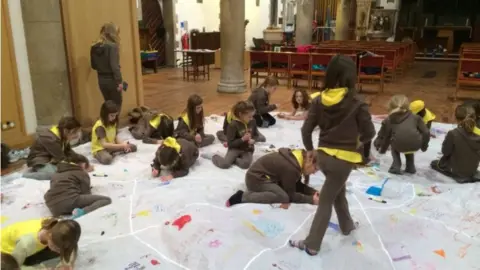 6th St John Brownies
6th St John BrowniesRunning in parallel, was the germ of an idea to reinvent the church as a venue for musicians.
"We'd had a couple of approaches about concerts and musical events because the acoustics are good there. We began inviting people to come and perform, and paying them to perform in the venue so we could get it on the scene as it were. Today of course, they pay us and that's wonderful the way that's turned around," he said.
To get a feel for how the conversion might look, the church committee created a temporary space at the back of the hall by removing a few pews and using portable equipment to create a "kitchen", despite the lack of running water or drainage.
"When we came to the planning of the reordering we bore in mind everything we'd been doing, so we put in the kitchen and toilets, accessible to all. We made all the doors accessible, so ramps on the steps.
"We put in a platform which can act both as a stage for performances and a platform for worship and we rewired the place, put theatre lighting in and upgraded the heating system to make the place comfortable and usable.
"The use of the place just mushroomed really and just flourished, so today we've got a huge footfall. We've got something happening almost every day in the building."
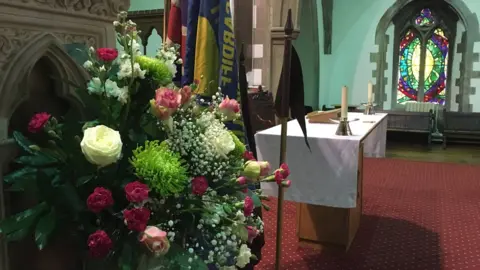
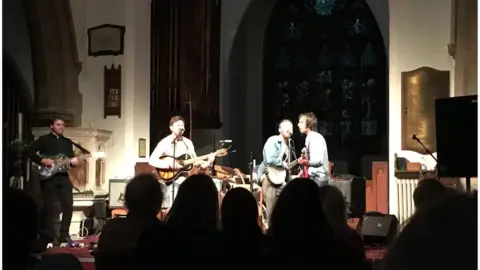
Mr Preece said the project was enormously aided by the "political will" of the congregation.
"We took the pews out and replaced them with chairs because it was much more flexible. I say to people if I'm showing them around and want to put on an event, we're not precious about all this furniture.
"We'd put the altar in a place where it is respected and secluded and not in the way of what [people] want to do. So long as people generally respect the building and respect the furnishings we have no problem with them being moved out of the way to accommodate what they're doing," he said.
"We've had craft fairs and fetes, and banquets and conferences and obviously concerts, and after-school clubs. A rehearsal space for choirs. Yoga. All of those things happen in the building."
'Medieval ideal'
A local organisation which helps recovering addicts, Recovery Cymru, entered into partnership with the church for a while for meetings and office space and still runs a weekly supper and social group there.
In December, the church will play host to a theatre production staged by a local director for two weeks before it moves on to London.
"In terms of principle, what we are trying to do is return to the medieval idea where the church is at the centre of the community and anything and everything can happen," he said.
"I borrowed a phrase from the Dean of Lincoln where I trained as a priest 30 years ago, and he used to say, 'We'll have anything here that's not illegal or immoral', and that line has always stuck with me."
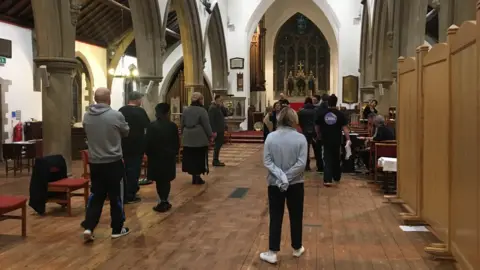
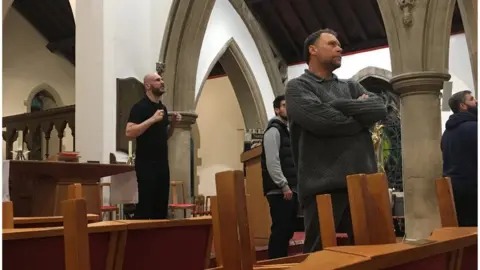
This view is strongly shared by the new Archbishop of Wales, John Davies.
He recalled dealing with an irate parishioner who complained the church itself was being used to sell locally-grown produce by informing him of the original use of altar rails.
"It was to keep animals out of the sanctuary, to separate the sacred from the secular. For church buildings having more mixed uses, we're going back to the time when there was no separate hall."
Indeed, he is trying to encourage parishes to rethink their estate exactly as St John's did, adding: "I can think of countless places where there is a big Victorian pile of a church next to a big Victorian pile of a church hall - you can flog one and use the other more creatively," he explained.
This summer Mr Davies held a hustings event held in Swansea Cathedral in the run up to the general election. He says many of the issues touched on in the campaign were legitimate concerns of churchgoers and the cathedral was therefore a suitable venue for these to be discussed.
However, he added: "We wouldn't have given permission for a political party to hold an event there but [it's different] for an event for people to come in and ask questions of a panel on religious or quasi-religious topics such as social justice."
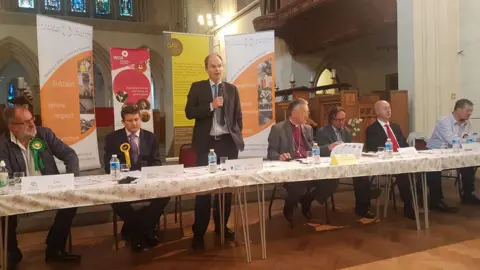 Church in Wales
Church in WalesDuring his time as Bishop of Brecon and Swansea, he oversaw the transformation of one Brecon church, St Mary's which was initially only open for an hour-and-a-half a week - a situation he called "ridiculous" - to a space hosting a cafe, exhibitions and comfy sofas for people to rest on which is open throughout the week.
Holy Trinity church in Llandrindod, Powys, where the Church in Wales held the recent archbishop election, has also diversified.
"One of the aisles in the church has been completely sectioned off and is used as a meeting place," the archbishop said.
He does not think these changes are undermining the traditional role of the church as a provider of worship.
Quite the opposite in fact: "One of the things I have been very keen to say is the church has to re-engage with society."
